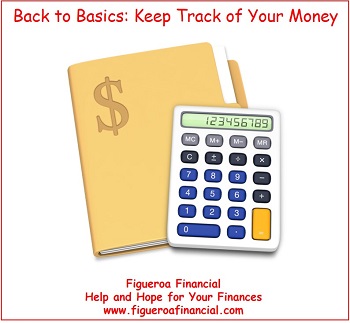 As I discussed in last week’s post, I want to spend the next few weeks going back to basics on how to get our finances under control.
As I discussed in last week’s post, I want to spend the next few weeks going back to basics on how to get our finances under control.
In my experience, one of the most important skills to develop with your finances is the ability to keep track of your money.
In order to gain control of your money, you need to understand what’s happening with it. How much comes in? How much goes out and for what?
How much money have you saved? How much money do you owe and to whom?
If you can’t answer these questions, you don’t have the level of understanding required to win with your finances.
So how do you get there? Here are 4 basic, easy things to do to keep track of your money.
The key is that you have to do them consistently:
1. Record Your Expenses
You need to keep a register of where your money is going. You can use the old fashioned approach of your paper checkbook register, computer software.
In many cases, you might be able to do it by using the on-line features of your bank or credit union.
Even if it is a few bucks for a venti latte or you just took $20 out of the ATM, record it and ensure it is categorized properly (e.g., utilities, gas, dining, groceries, etc.).
2. Keep your Checkbook Balanced
Every month, your bank or credit union will provide you with a statement of your checking and savings accounts.
Spend a few minutes balancing your checkbook. It does not take long and it will help you know where you stand with your money.
You can also avoid overdraft fees, find expenses you might have forgotten to record, and also discover erroneous charges due to bank errors or worse, erroneous charges due to identity theft.
The instructions for balancing your checkbook are usually included on the back of your statement.
Do it every month!
3. Maintain a Net Worth Report
You need to know what is the value of your assets (what you own outright such as savings, retirement accounts, property), and your liabilities (your debts such as credit cards, car loans, student loans, and mortgages).
Your net worth is the difference between your assets and your liabilities.
Most financial management tools provide you with an easy way to track your individual assets and liabilities so you can keep track of your net worth.
4. Establish a Written Budget
As you begin to habitually do the actions above, you will begin to gain great insight into where your money is going.
This will help you greatly as you tackle the task of living on a budget.
Remember, a working budget will be the most powerful tool in your arsenal.
This is a simple blue print for managing your money: how much money comes in (i.e., your income) and how much money goes out.
The key is that you have to do it every month before the month begins. You have to plan it and live it!
As usual, it is always up to you to change your ways. You have to decide that this is important enough for you to do it.
“Be diligent to know the state of your flocks, and attend to your herds;”
Proverbs 27:23 (NKJV)
Question: What tools are you using to keep track of your money?
This post is also available in: Spanish

This is a really good reminder for those just starting to be financially responsible and to financial veterans. A Net Worth Report is often overlooked. Thanks for your reminders and great blogs.
Thank you Taz! It is good to go back to fundamentals about our money. We all can use reminders!
Pingback: Manly Money Management – Figueroa FinancialHelp and Hope for Your Finances